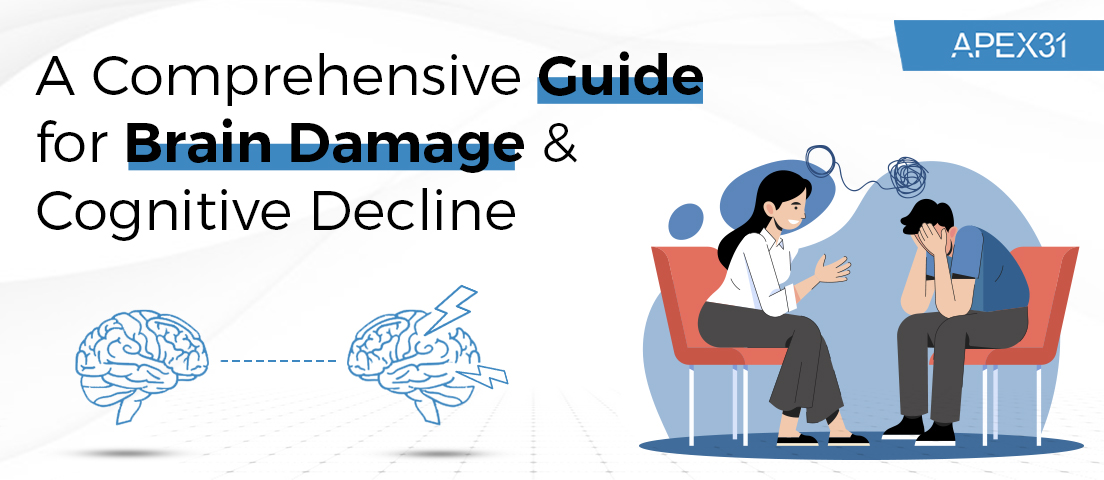A Comprehensive Guide for Brain Damage & Cognitive Decline

Are you aware of the fact that the landscape of brain health has shifted significantly? In fact, conditions such as Alzheimer’s, along with dementia, have continued to pose different types of challenges. However, a growing level of awareness regarding cognitive decline’s potential causes and possible solutions has empowered several individuals to take proactive steps.
You need to understand that cognitive decline isn’t a necessary part that will accompany you during your old age. It’s a combination of many factors which might impact brain health over time.
In this insightful blog post, you’ll learn about the various contributors to brain damage and cognitive decline. So, let’s begin!
Impact of Chronic Stress
Chronic stress is an important component which contributes greatly to the deterioration of your brain health. In fact, prolonged exposure to several stressors can trigger a continuous release of cortisol, which is the body’s primary stress hormone. The acute cortisol release might improve focus and memory in short-term situations. However, sustained high levels can wreak havoc on the structure of the brain, especially the hippocampus, which is a region that is critical for learning and memory formation.
According to the latest research, chronic stress can lead to reduced hippocampal volume and even impaired neurogenesis. Even beyond the structural changes, regular cortisol exposure can have a negative impact on functions such as attention, decision-making, and problem-solving. It can make everyday tasks seem quite overwhelming.
Managing chronic stress by utilizing techniques such as mindfulness, meditation, and deep breathing can prove to be a major pillar of cognitive preservation. By effectively limiting your stress, you can regulate your cortisol levels, protect neuroplasticity and even protect the delicate neural network, which is the reason behind our brain’s robust cognitive abilities.
Nutrient Deficiencies
Do you know that the brain is just 2% of our body weight? But, still, it consumes a great amount of our daily energy and requires a sufficient amount of nutrients to function in an optimum manner. You would be surprised to know that deficiencies in the most important vitamins and minerals can negatively impact cognitive performance and play a role in long-term decline.
If you take the example of B vitamins, such as B12, folate(B9), and B6, they are quite important for neurotransmitter synthesis and myelin formation. They impact mood, memory, and nerve signal transmission as well. Omega-3 fatty acids, such as DHA, are the building blocks of brain cell membranes. They possess potent anti-inflammatory properties, which are important for neuronal health. Vitamin D acts as a neurosteroid which influences brain development and function. Magnesium and zinc are important cofactors for different types of enzymatic reactions in the brain, which impact not just synaptic plasticity but stress responses as well.
A diet that is rich in unprocessed food items, fruits, vegetables, lean proteins, and healthy fats can be the foundation of a healthy brain. Alongside this, supplementation, according to your assessment, can help you in getting rid of specific deficiencies which might be impacting your cognitive vitality.
Chronic Inflammation
Chronic inflammation is a low-grade and regular immune response which is now recognized as a major reason behind cognitive decline and neurodegenerative diseases. Chronic inflammation can not only damage healthy brain cells but also their pathways as well.
This inflammation can originate from different types of sources, such as autoimmune disease, unresolved infections, and even gut dysbiosis. Some other reasons include having a pro-inflammatory diet that consists of processed foods, refined sugars, and unhealthy fats. When the brain experiences chronic inflammation, it can cause issues in the integrity of the blood-brain barrier, which allows harmful substances to enter and cause neural damage.
This persistent inflammatory state can lead to oxidative stress, which can impair neuronal function and accelerate cognitive decline. Having an anti-inflammatory lifestyle, having a nutrient-dense diet, and addressing inflammatory conditions are important steps in protecting brain health.
The Role of Physical Activity
Have you been informed that regular physical activity can be quite beneficial for brain health and a great antidote to cognitive decline? Regular exercising and that too aerobic activity have been proven to increase the blood flow to the brain, providing vital oxygen and nutrients as well. This improved circulation supports neurogenesis, the growth of new brain cells, and promotes neuroplasticity, which is the brain’s amazing ability to adapt and reorganize itself.
Physical activity also plays a huge role in regulating neurotransmitters, improving mood, reducing anxiety, and even boosting focus. Even beyond the aerobic benefits, strength training can greatly contribute to brain health by influencing hormonal balance and even promoting vascular health. Both of these things are crucial for cognitive function. In case you live a sedentary life, you have a higher risk of facing cognitive issues along with neurodegenerative diseases.
By incorporating a mix of aerobic exercises such as brisk walking, swimming, or cycling, you can increase your cognitive resilience. Alongside this, if you add resistance training, you can have a sharper and healthier mind for many more years.
Final Thoughts
Cognitive decline and brain damage have become big issues in not just North America but the whole world as well. However, you need to understand that our brain health is greatly impacted by our lifestyle choices, environmental exposure, and internal physiological states.
The damaging effects of chronic stress and systemic inflammation play a role in damaging the functioning of the brain. In fact, the foundational roles of proper nutrition, hydration, and sleep can contribute to the strength of the most important organ of the human body.
Knowing about the intricate mechanism which governs brain function, you can mitigate the risk of cognitive decline. By following this approach, you can be sure of improving your brain’s health for years to come.



